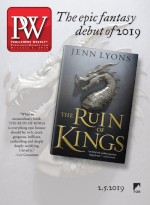In Dear Los Angeles (Modern Library, Dec.), Kipen collects passages from letters and diaries about the wonders and horrors of L.A. through the centuries.
The letters and diaries you excerpt go back to the 16th century. Is there anything that’s quintessentially Los Angeles way back then?
Well, sure. In early diaries by Spanish and British explorers, they talk about the air pollution—the smoke from the cook fires of the Indians. The area was even called “The Bay of Smokes.” And there’s a wonderful diary entry from Helen Hunt Jackson, a 19th-century writer, who wrote a California romance called Ramona. She describes the [Mexican] Californios on horseback in the pueblo of Los Angeles and how they are as comfortable in the saddle as you and I would be on foot, recklessly doing equestrian tricks just for fun and narrowly missing one another as they careen around on these dirt streets. She’s writing about traffic in Los Angeles.
A lot of creative people come to Los Angeles for the film industry. Were they a good source for you?
I found that the best writers about Hollywood were screenwriters who came out from Chicago newsrooms and Broadway. I was able to get interesting synergies and frictions with industry people. I juxtaposed selections from a hero of mine, Dalton Trumbo, the great blacklisted screenwriter, with the diaries of Charlton Heston. Heston was politically the opposite of Trumbo, but he has these wonderful diaries about the shooting of both A Touch of Evil, where he writes wonderfully about Orson Welles, and Planet of the Apes. I also found interesting writers that most people have never heard of, like Eric Knight, a British screenwriter who came out with lavish dreams for movies as an art form and had a nervous breakdown. So he went out to the Valley to farm alfalfa and got a dog—and then wrote Lassie Come Home.
You quote Eric Knight describing L.A. as “such beauty in such a childish hell-hole.” Why do people think of L.A. as soulless?
Because they’re homesick, because it’s very different from where they came from, and because they don’t know what the hell to make of it. What’s fun is to watch people change their minds. There has never been any doubt in my mind that Los Angeles has a soul. It’s not till you move away—I moved away for college—that you realize there was something to be missed: the light, the beauty, the mystique. I came to miss it through writing, through the songs of Tom Waits and the writing of Raymond Chandler. It is impossible for any lover of Raymond Chandler to drive around the city and not see this stereopticon view of present and past in parallax.
Why is L. A. better than New York?
I lived in New York for two summers, and I’m very fond of it, but New York feels a little written out to me. L.A.’s a teenager—it’s gawky and it’s got zits all over it, and feels like it’s got more unwritten chapters yet to be published.



 Volume 265
Issue 40
10/01/2018
Volume 265
Issue 40
10/01/2018





